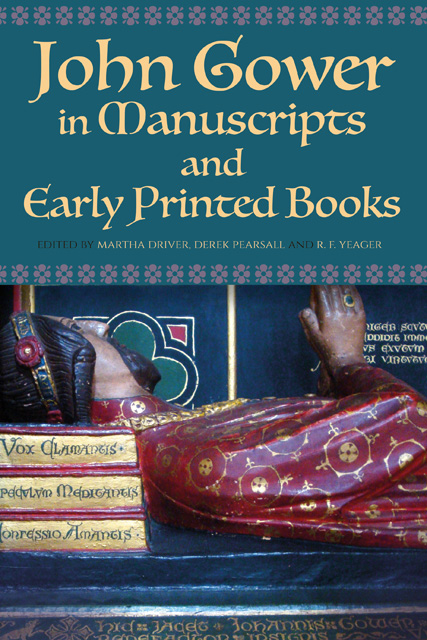Introduction
Published online by Cambridge University Press: 18 January 2023
Summary
The study of the poetry of John Gower originated, one might fairly say, with the careful scrutiny of manuscripts and early printed books. G. C. Macaulay, Gower’s first and still foremost comprehensive editor, grounded his four-volume edition of the poet’s oeuvre (1899–1902) in a meticulous examination of the full complement of Middle English, Anglo-French, and Latin copies of Gower’s work known to him, both in manuscript and black letter. Much later, John Fisher likewise spent significant time with the manuscripts while producing the first scholarly monograph in English devoted entirely to Gower’s work, his John Gower: Moral Philosopher and Friend of Chaucer (1964). Ironically, perhaps, these pioneers may have done their work a bit too well: for decades, past the middle of the last century, with but a few notable exceptions scholarly studies of Gower’s poetry relied primarily on Macaulay and Fisher for paleographic and bibliographical details. Clearly, this was hardly sustainable practice.
A great deal of the credit for broadening the focus of scholarship to include the manuscripts and early printed editions of poets like Gower must go to the Early Book Society. Since its founding in 1987, the Early Book Society through biennial conferences and (since 1997) JEBS – the Journal of the Early Book Society – has been indispensable in bringing about the present resurgence of interest in manuscripts, incunabula, the scribes and printers who made them, and the libraries – ecclesiastical, common, and private – that housed them. Given the converging concerns of the Early Book Society and the Gower Society, the overlapping of many of their members, and their contemporaneity (the Gower Society was founded in 1984), it hardly seems surprising, in retrospect, that the two would find occasion to co-sponsor an international meeting – as they did in 2017.
In that year, the Fifteenth Biennial Conference of the Early Book Society and the IV International Congress of the John Gower Society convened jointly on the grounds of Durham University with the purpose of combining their members’ wide-ranging expertise to establish new approaches to the materiality of Gower’s work. The fourteen essays collected here represent substantial evidence of the profound success of that shared enterprise.
- Type
- Chapter
- Information
- John Gower in Manuscripts and Early Printed Books , pp. 1 - 10Publisher: Boydell & BrewerPrint publication year: 2020



